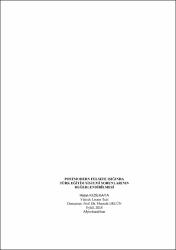| dc.contributor.advisor | Ergün, Mustafa | |
| dc.contributor.author | Kızılkaya, Hasan | |
| dc.date.accessioned | 2015-03-13T09:17:52Z | |
| dc.date.available | 2015-03-13T09:17:52Z | |
| dc.date.issued | 2014 | |
| dc.date.submitted | 2014 | |
| dc.identifier.uri | http://hdl.handle.net/11630/2768 | |
| dc.description.abstract | 1950’lerde ortaya çıkan ve anti-modernist sanatsal uygulamaların karmaşıklığını ifade etmek için kullanılan postmodernizmin sadece bir düşünce, bir kavram değil aynı zamanda bir uygulama alanıdır ve farklı uygulama alanlarında farklı bakış açıları bulunmaktadır. Bir çalışma alanı olarak eğitim de bu eğilimin etkisi altına girmiştir.
Son yıllarda Türk eğitim sisteminde postmodern olgularağırlık kazanmaya başlamıştır. Bu durum mevcut iktidarın postmodern bir politika izliyor olmasının doğal bir sonucudur. Postmodernizmin etkisi, 2005-2006 eğitim öğretim yılında postmodern eğitim kuramı olarak kabul gören yapılandırmacı yaklaşıma geçilmesi ile daha da belirginleşmiştir. Eğitim sistemi öğrenci merkezli, sonuç değil süreç odaklı, nesnel bilgiden ziyade bireyin bilgiyi yapılandırmasına dönük bir hal almıştır.
Çağdaş Türk eğitim sisteminin güncel sorunları ve bu sorunların temellerini postmodern felsefe ışığında değerlendirmek bu çalışmanın temel konusudur. Ayrıca Türk eğitim sisteminde son yıllarda gerçekleşen reform hareketleri, yapısal köklü değişiklikler ve bunların felsefi temellerine de yer verilmiştir. Bu çalışmanın postmodernizmin Türkiye’de tam olarak anlaşılmasına katkı sağlayacağı düşünülmektedir. | en_US |
| dc.description.abstract | The concept of Postmodernism which emerged in the 1950s and used to express the complexity of anti-modernist art practices is not only a thought or a concept, but also it is a practice and it has different perspectives in different fields. Education as a study field is also currently under the influence of this trend.
Postmodern phenomena in Turkish education system has started to gain weight in recent years. This is a natural consequence of pursuing a postmodern policy. The influence of postmodernism became more pronounced in the 2005-2006 academic year adopting constructivist approach which accepted as a postmodern educational theory. Education system has become student-centered and process-oriented rather than teacher-centered and outcome-oriented. Instead objective information, construction of the knowledge is emphasized.
The current issues in contemporary Turkish education system and to evaluate these issues within the scope of postmodern philosophy are the main concerns of this study. Furthermore the Turkish education system, the reform movement in recent years, structural changes and their philosophical foundations are tried to be explained.In addition, the study is expected to contribute to the conceptualizing of postmodernism in Turkey. | en_US |
| dc.language.iso | tur | en_US |
| dc.publisher | Afyon Kocatepe Üniversitesi, Sosyal Bilimler Enstitüsü | en_US |
| dc.rights | info:eu-repo/semantics/openAccess | en_US |
| dc.subject | Türk Eğitim Sistemi | en_US |
| dc.subject | Eğitim Sorunları | en_US |
| dc.subject | Postmodern Eğitim | en_US |
| dc.title | Postmodern Felsefe Işığında Türk Eğitim Sistemi Sorunlarının Değerlendirilmesi | en_US |
| dc.title.alternative | Evaluation of the Turkish Education System Problems Within the Scope of Postmodern Philosophy | en_US |
| dc.type | masterThesis | en_US |
| dc.department | Afyon Kocatepe Üniversitesi, Sosyal Bilimler Enstitüsü Eğitim Bilimleri Anabilim Dalı | en_US |
| dc.relation.publicationcategory | Tez | en_US |



















